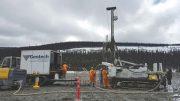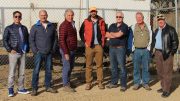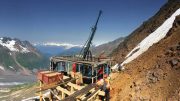VANCOUVER — Geologists quickly learn not to lick the rocks when visiting Atac Resources’ (TSXV: ATC; US-OTC: ATADF) Rackla gold property, 100 km northeast of Keno City in eastern Yukon. The last gasp of Carlin-style gold mineralization that flushed through the region stained the crust with orpiment and realgar — bright red and orange sulphide minerals teeming with arsenic.
The Northern Miner and a handful of newsletter writers and analysts carefully dug through one such outcrop at the property’s Osiris Cluster during a site visit in July 2017.
At the time, the company was in the midst of a 15,000-metre drill program, largely aimed at expanding high-grade mineralization at Conrad and Sunrise, two of the four main targets at Osiris.
During a follow-up interview in January, Atac’s president and CEO Graham Downs tells The Northern Miner the results from the $10-million program were satisfying.

Newsletter writers and analysts surround Julia Lane, Atac Resources’ vice-president of exploration (centre, yellow vest) as she explains the geology of Carlin-style systems in the Yukon. Photo by Lesley Stokes.
“We wanted to step out and build resources this past year, and we did just that,” Downs says. “We found new zones of mineralization and hit where we thought we’d hit — that really speaks to the style of the deposit and strength of the system.”
The company pointed the drills at a series of north-trending structures that likely introduced metal-rich fluids into the carbonate rock package.
Much like the Carlin-style gold deposits of northern Nevada, the fluids on Atac’s ground in the Yukon travelled along the faults and pooled in the crests of small-scale folds, dissolving the carbonate rocks and precipitating gold.
At Conrad — the most advanced target at the Osiris cluster — drilling this year returned 67.1 metres of 3.4 grams gold per tonne and 12.5 metres of 20.8 grams gold. Meanwhile, hits of 15.2 metres of 13.5 grams gold and 10.4 metres of 8 grams gold added shine to Sunrise.
“We can really add value by drilling these zones. They’re near surface and all open. Our only challenge is having so many quality targets, but we’ll take that. It’s a good problem to have,” he says.

Classic Carlin-style gold mineralization in drill core at Atac Resources’ Osiris gold project in the Yukon, showing the telltale oranges and yellows of arsenic-rich sulphide minerals. Photo by Lesley Stokes.
Atac is calculating a maiden resource for Osiris, but is in no rush. The company expects to add to the database by drilling another 15,000 metres this year, expanding upon the high-grade zones.
“We don’t want to prematurely do a resource, we want to build up what we have and not leave any ounces out. There are still a lot of new areas left to drill,” he says. “You need a bunch of ounces up here to make it work — and that’s going to take some time. It’s a huge district, and most people, including smart money, understand that.”
Atac has already defined 485,700 oz. gold in 5.7 million measured and indicated tonnes of 2.7 grams gold at its Tiger deposit — a higher-temperature, carbonate-hosted deposit located 100 km west of Osiris on the property’s Rau project.
Some of the drilling this year extended mineralization east and west of Tiger, with highlights including 51.8 metres of 5.7 grams gold and 64 metres of 2.46 grams gold, and also confirmed a new oxide gold zone at the Tiger East anomaly, where drilling intersected 21.3 metres of 2.6 grams gold.

Atac Resources’ vice-president of exploration, Julia Lane (centre) is joined by president and CEO Graham Downs (right) as she explains the geology of Carlin-style gold systems to visitors in the core yard at Atac’s Rackla gold property in the Yukon. Photo by Lesley Stokes.
The company is advancing the project towards feasibility, having already completed an updated preliminary economic assessment in 2016. The report highlighted an after-tax net present value of $75.7 million, assuming a 5% discount rate, and a 28.2% internal rate of return on a nine-year, 1,500-tonne-per-day open-pit operation.
“We did a little bit of drilling this year at Tiger and that really boosted our confidence in what we had,” Downs says. “Tiger and the whole Rau trend is a really fertile area that we never really got back to after finding the Carlin systems out to the east, so we’re excited to get back there and do some bulk sampling and more advanced exploration this year.”
Downs says the company also hit a milestone at Tiger last year, by receiving regulatory approval for a 65 km, $11-million tote road.
Although Tiger is back on the company’s radar, the opportunity for Carlin-style mineralization elsewhere at Rackla remains the company’s priority.
“Osiris and the Carlin-style targets are definitely the driver of the property — that’s where we’ve had the best results, the highest grades and see the best potential. Some of those grades are quite spectacular,” Downs says.
It was arsenic, antimony and mercury in government geochemical surveys that led the company to discover Osiris in 2010 — the first Carlin-style system outside Nevada’s prolific gold belts.
Since the early discovery days, the company has advanced Rackla considerably — hitting milestones that include expanding its land position to 1,700 sq. km, outlining dozens of targets along a strike-length comparable to Nevada’s Cortez trend, and even a potential US$55.5-million joint venture with industry giant Barrick Gold (TSX: ABX; NYSE: ABX) on the property’s Orion project.

Map of project areas across Atac Resources’ 1,700 sq. km Rackla gold property in the Yukon. Credit: Atac Resources.
“You could fit the entire northern Carlin trend just at the eastern end of our property,” Downs says.
“It’s really virgin ground for Carlin-style mineralization. It took 60 years to identify and develop the deposits in Nevada, whereas with us we’ve only been here for a few years. That’s what makes this district so fun to explore, and why everyone is excited to be part of its early days.”
Downs says Barrick spent its first year at the project compiling geological data for an upcoming drill program. The major spent $4 million on geophysical surveying, soil and stream geochemical surveying, and geological mapping to find potential targets.
“We’re definitely on the right path. We have a big project, cash, the most news we’ve had in many years, Barrick’s onboard and we’re working towards a maiden resource at Osiris,” Downs says. “One of the challenges we’ve had was: How do you explore this thing? Now, we have money and expertise coming in from Barrick to accelerate the work and move this project forward, faster.”






Be the first to comment on "Atac hunts for more Carlin-style gold at Rackla"